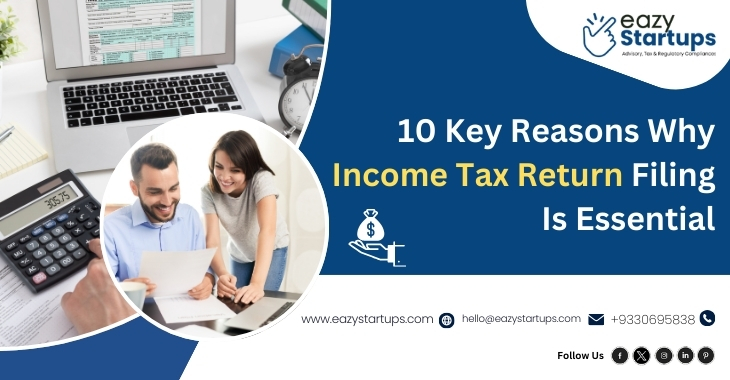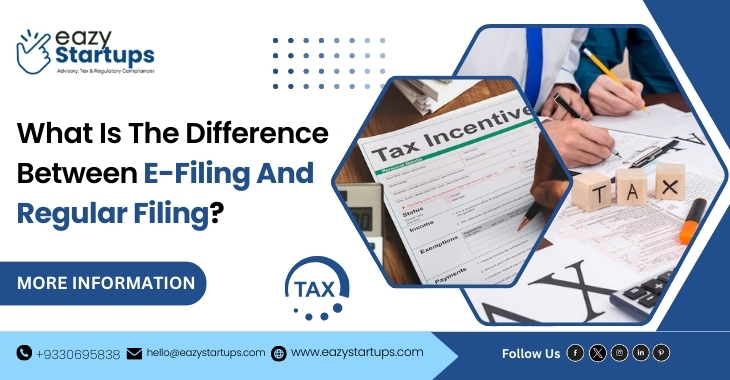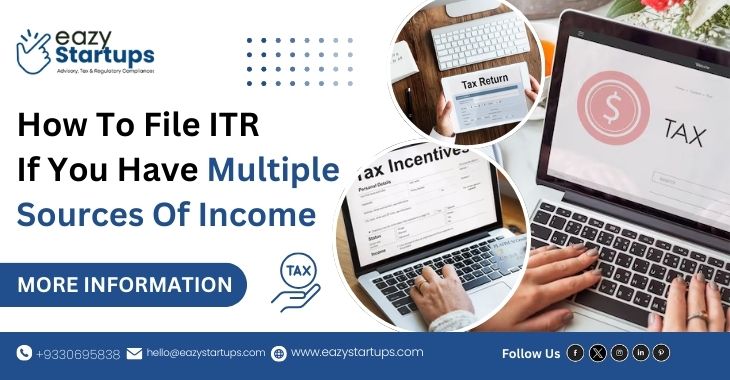Online tax filing has increased so the protection of sensitive financial data has become a fundamental requirement. Every taxpayer needs to exercise caution about their financial data security since cybercriminals search for vulnerable security practices constantly. Seven secure methods exist for sharing financial data during online tax filing. If you want to have expert guidance for Online Income Tax Filing, Eazy Startups can help you out.
Let’s explore the ways:-
1. Use Trusted Tax Filing Platforms
2. Enable Two-Factor Authentication (2FA)
3. Avoid Public Wi-Fi Networks
4. Encrypt Your Files Before Sending
5. Update Your Devices and Software
6. Use Secure Communication Channels
7. Monitor Your Accounts for Suspicious Activity
Use Trusted Tax Filing Platforms:
Make your tax filing platform selection from reputable established software providers. Such platforms must implement strict data protection protocols that use encryption methods together with secure server infrastructure. Search for tax filing platforms which hold IRS authorization and display SSL (Secure Sockets Layer) and HTTPS certification in their website URLs. Software platforms that are trusted by users maintain regular updates of their security features to defend users from contemporary cyber attacks.
Enable Two-Factor Authentication (2FA):
Two-factor authentication creates an additional security barrier for account protection. Your tax filing account demands two authentication elements for login because it needs both your password and a verification code sent to your email or phone. The combination of two authentication factors makes it nearly impossible for unauthorized users to gain access even if they have your password.
Avoid Public Wi-Fi Networks:
The sharing or uploading of sensitive financial documents must be avoided when using public Wi-Fi at cafes, libraries, airports, and similar unsecured networks. Hacking attacks can occur through public Wi-Fi networks because these networks lack proper security protection. Public users who need internet access should protect their data by using a Virtual Private Network (VPN), which encrypts their information and conceals their online activities.
Encrypt Your Files Before Sending:
Before sending financial data to tax preparers or accounting services through email or upload you must encrypt the files. 7-Zip and WinRAR serve as software tools that enable you to add passwords to your documents. Securely transmit the password to the recipient through a different method such as a phone call or SMS instead of placing it within the same email.
Update Your Devices and Software:
The key to security lies in maintaining your devices together with browsers and software at the most recent update versions. Security updates within software packages contain fixes that address potential hacker targets. Postponing software updates creates an environment where cyberattacks become more likely to occur while handling personal financial data. Enable automatic updates whenever possible because they provide continuous security protection.
Use Secure Communication Channels:
Secure portals and messaging platforms should be used instead of standard email when you need to communicate with your tax preparer. Professional tax services provide encrypted client portals to their users. These online platforms were created specifically to facilitate the exchange of personal information and tax documents. Social Security numbers and banking details along with tax forms must not be sent through unsecure email or text.
Monitor Your Accounts for Suspicious Activity:
Regular financial account monitoring together with credit report checks remain essential after you file your taxes. Check your bank transactions for any unexpected activities and unauthorized spending. When you notice suspicious behavior you can immediately react by freezing your credit and changing passwords as well as reporting identity theft to the IRS and relevant authorities.
Conclusion
Filing taxes online offers convenience, but it also brings the responsibility of protecting your sensitive financial data. Following these secure practices—using trusted platforms, enabling 2FA, encrypting files, and avoiding public Wi-Fi—can greatly reduce your risk of data breaches or identity theft. Make cybersecurity a priority while filing your taxes, and stay one step ahead of potential threats. If you wish to get professional guidance for safe and error-free Online Income Tax Filing, Eazy Startups can be a great choice for you.











Recent Comments